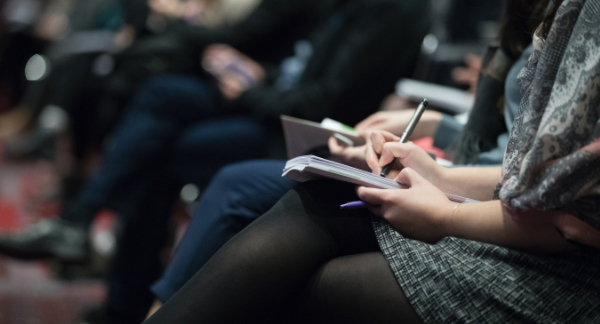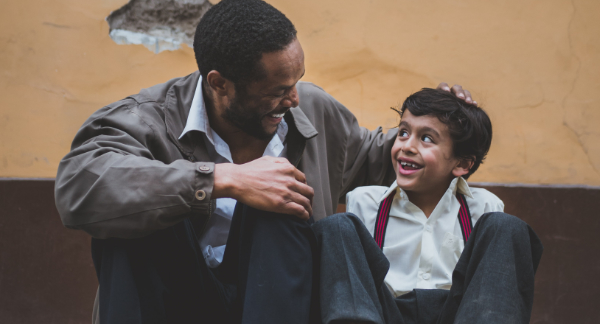With numerous voices on multiple digital platforms, we can feel overwhelmed by all the ideas and opinions expressed. We wonder who is really listening? Do we listen to anyone well? To be heard is a deep human need. But do we know how to listen to be heard?
Pope Francis, in his message for the 56th World Communications Day to be celebrated on Sunday, May 29th, offers the Church and the world a reflection on listening and how it’s an essential element to true and authentic communication. If everyone communicates but no one listens, we have a calamitous cacophony of voices with no message being understood or even less reflected upon to communicate thoughtfully in response. According to Pope Francis, listening takes work.
Social Media’s Reality
It seems that today, especially because of the phenomenon of social media, key issues of moral and human importance are less debated than demanded. Through online posts and comments, people express this demanding attitude that they be heard using all caps or emojis. The art of listening is left by the wayside and an all-out “shouting” match through vitriol language rules the day. Many people seem to just put out their thoughts without really trying to understand anyone else, or when they do respond to another it is through harsh critical language rather than in a manner that truly seeks understanding and dialogue.

Social media is a gift in that everyone can have a voice and communicate their ideas. It thrives on short, pithy, and clever comments. However, social media doesn’t give us the time to reflect or dialogue constructively. It’s meant to be a place to express one’s thoughts and maybe respond to others, retweeting or sharing posts we like or agree with, but algorithmically rarely seeing alternative opinions. And when we do, thoughtful and respectful language on these platforms is sometimes forgotten, even by Catholics and among leaders of the Church.
Listening requires humility. Pope Francis writes, “listening corresponds to the humble style of God” since, “God always reveals himself by communicating freely.” It takes humility and personal freedom to go out of oneself toward another. Putting ourselves aside to pay attention to another is not a common virtue on social media and unfortunately, it’s less seen in society as well. To listen means to withhold judgment to hear with the “ear of the heart,” as the Pope says. That requires an attitude of kindness, selflessness, and love.

Pope Francis expounds on how “listening is a dimension of love.” He says that when we deem the other as someone worthy of our attention because they are a human being like us with ideas and opinions, we are offering them the gift of love. The opposite is listening for the sake of argument and only hearing what one wants to hear, preparing a response to prove the other person is wrong. That is one-sided communication and not listening out of respect for the other. He writes, “It is only by paying attention to whom we listen, to what we listen, and to how we listen that we can grow in the art of communicating, the heart of which is not a theory or a technique, but the ‘openness of heart that makes closeness possible.’ (cf. Apostolic Exhortation Evangelii Gaudium, 171).”

Pope Francis challenges every person to examine themselves on their “interior deafness.” What blocks us from truly hearing another person? He presents three ways we act on this “deafness.” First, is by eavesdropping or spying on another which has become an acute issue through social media. Listening happens when there is fair and honest openness, he says. The second lack of listening is by talking past one another. This happens when we seek consensus rather than the common good and actual truth. He says that good communication, “doesn’t try to impress the public with a soundbite,” but rather tries to understand the other person and the complexities of reality. The third “interior deafness” we are called to overcome is imposition of one’s point of view. He warns against a dialogue that becomes a “duologue” or a monologue of two voices each expressing their opinions to change the other. It is obvious from these ways we are deaf to one another that listening is indispensable for good communication to take place. Afterall, we all have a deep need to be heard.
The Role of Journalism
Pope Francis comments, “There is no good journalism without the ability to listen. In order to provide solid, balanced, and complete information, it is necessary to listen for a long time.”

Social media has changed the very landscape of journalism as well. What once took a journalist time to gather facts no longer is relevant in the age of instant information. Listening for facts has been compromised. Getting the image or story out trumps the seeking of truth, since time, which tempers rashness and judgment, is not a value in reporting the news.
It is no wonder why less than a third of the population trusts traditional news sources about various social issues. This may be the reason. Journalism has devolved over time because of social media offering every person a platform of instantaneousness including corporate media executives seeking clicks rather than in-depth analysis on stories that matter. Journalism has also eroded because of government interference of the so-called Fourth Estate, which traditionally challenges politicians and government leaders on social issues.

This is why media mindfulness is an essential skill in the digital age. It takes time to reflect, consider, question, and analyze the messages we receive from the media, as well as what we create. It takes time to seek the truth by evaluating various sources. Listening, in this sense, takes us deeper to the heart of a message and helps us become critical engagers in the media culture.
There is a way to retrieve the value of good journalism. Pope Francis lays out some key points when he says that news reporting requires one to, “know how to listen, to be ready to change one’s mind, to modify one’s initial assumptions.” He says that listening to multiple sources ensures more reliability and lends a seriousness to the information transmitted. Listening, he says, is an exercise in discernment.
Listening apostolate
What does it take to be a good listener? Pope Francis speaks of the “martyrdom of patience” in authentic dialogue especially in difficult circumstances. “Listening always requires the virtue of patience, together with the ability to allow oneself to be surprised by the truth, even if only a fragment of truth, in the person we are listening to.” Amazement and wonder are hallmarks of knowledge. Considering the wonder of a child, we are enriched by even the smallest of incidences in which we can learn from another person.

For those in the Church, pastoral activity becomes an “apostolate of the ear.” To listen before speaking, and attend to the other with patient wonder, is an act of love—the greatest gift we can give to the other. This includes the giving of our time to be with another person. The Pope believes that “freely giving some of our own time to people is the first act of charity.”
In an age of digital cacophonous voices, the Church is called to be “symphonic” such as in a choir where all the voices work in harmony with one another. They are all different tones with unique sounds creating not a uniformity of sound, but a polyphony where “each voice…sings while listening to the other voices in relation to the harmony of the whole.” The synodal process the Pope proposes to the whole Church is to be just that—a polyphony of voices listening to one another while singing to the glory of God and salvation to all humanity.
________
For the Pope's full WCD message, click here.
About the Author

Sr. Nancy is the Director of the Pauline Center for Media Studies and a Media Literacy Education Specialist. She has degrees in Communications Arts and a Masters in Theology and the Arts from Fuller Theological Seminary. She has extensive experience in the creative aspects of social media, print media, radio and video production as well as in marketing, advertising, retail management and administration.
Sr. Nancy has given numerous media mindfulness workshops, presentations and film retreats around the country to youth, young adults, catechists, seminarians, teachers and media professionals helping to create that dialogue between faith and media. She is a member of NAMLE (National Association of Media Literacy Educators), SIGNIS (World Catholic Association for Communicators) and THEOCOM (Theology and Communications in Dialogue) and board member of CIMA (Catholics in Media Associates). She is the author of a theology of popular culture called, A Sacred Look: Becoming Cultural Mystics from Wipf & Stock Publishing. Sr. Nancy is a theologian, national speaker, blogger and film reviewer.